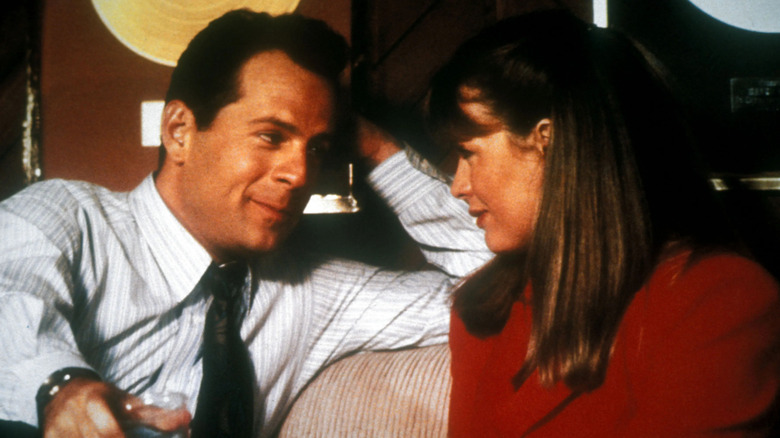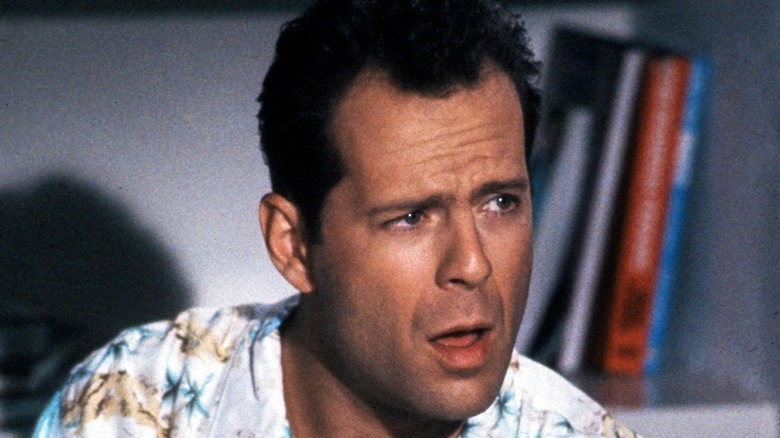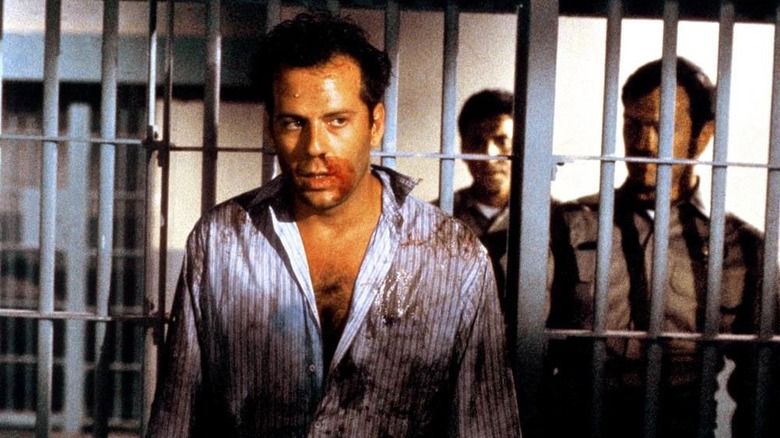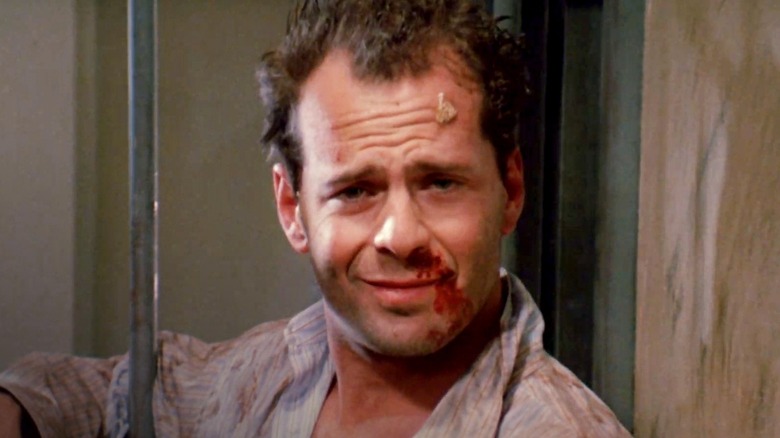Bruce Willis' First Movie Was Directed By A Hollywood Legend
Most people with a cursory knowledge of Hollywood history have a general understanding that the movie stars of today were the unknown (or barely-knowns) of yesterday, and that most actors get their start in projects that are either barely seen or exist at some level of disrepute. It's a bit of camp fun to check out some of these unlikely early works and see future A-list talent turn up in B-movies: Tom Hanks in "He Knows You're Alone," for instance, or Meg Ryan in "Amityville 3-D," or Denzel Washington in "Carbon Copy." Then there's the flip side of this phenomenon, where a future star gets a big, juicy role in a prestige picture made by an established director, like Dev Patel in "Slumdog Millionaire," or Hailee Steinfeld in "True Grit."
There is also, however, a happy medium to these two extremes: a film made by a Hollywood legend which debuts a future movie star even if the film itself doesn't make a huge splash. This rarer category perfectly sums up 1987's "Blind Date," which features the first credited film role for Bruce Willis. Although the film wasn't an abject failure — it made $39.3 million over a $16 million budget — it wasn't critically well-received, and couldn't be said to kickstart Willis' film career outright (that honor goes to the blockbuster hit "Die Hard," released a year later in 1988). Instead, it's the Platonic ideal of a curio: for director Blake Edwards, it's a footnote in an illustrious Hollywood career. For Willis, it's a first film that provides a glimpse at what his screen persona almost was, along with an explanation of where he would end up going once his star had fully risen.
How Blake Edwards struggled to keep farce alive during the age of the sex comedy
If you know the name Blake Edwards, you probably know it from one of the several classic movies he directed, especially "Breakfast at Tiffany's," "Days of Wine and Roses," "The Pink Panther" (and several of its sequels), "The Great Race," "The Party," and "Victor/Victoria." Although Edwards became known for his comedy chops, it wasn't a genre he worked within exclusively. He also made several film noirs ("Experiment in Terror," "Gunn," and "The Tamarind Seed"), westerns ("Wild Rovers"), and even a gritty procedural thriller based on a Michael Crichton novel, "The Carey Treatment."
Yet apart from his golden age comedy films, it's likely that Edwards is most known for a trend he inadvertently helped kick off: the '80s sex comedy. His 1979 hit "10" became a complimentary part of the sex comedy wave that was hitting cinemas around that time; where films like "Animal House" and "Porky's" were catering to a horny teenager demographic, "10" and its spawn — films like "Blame It On Rio" and "Hardbodies" — appealed to the middle-aged male looking to have a fling. While Edwards didn't suddenly pivot and dive into making a bunch of adult sex comedies, he occasionally attempted to subvert this newfound brand.
He played around with the iconography of an aging sex symbol like Burt Reynolds in "The Man Who Loved Women," leaned further into farce with "Skin Deep," and flipped the script on a misogynist by switching him into a woman's body in "Switch." While the majority of the comedy in "Blind Date" is Edwards continuing his penchant for farce, it also contains a "be careful what you wish for" thread for randy men, giving Willis' character a beautiful woman (Kim Basinger) as a blind date who then proves way too much for him to handle.
'Blind Date' and the myth of TV actors making it in film
Even though Bruce Willis was by no means a movie star when "Blind Date" premiered, that's not to say he wasn't a star of any kind. Willis was already familiar to audiences as the co-star of the successful rom-com mystery show "Moonlighting," which he appeared in from 1985 through 1989. In "Moonlighting," Willis played David Addison, a wisecracking head of a Los Angeles detective agency who teams up with former fashion model Maddie Hayes (Cybill Shepherd) when she realizes she owns David's agency as a tax writeoff. The show became famous in large part due to the classic screwball romance chemistry between Willis and Shepherd, resulting in one of the most long-running and controversial "will they/won't they" romances in television history.
It only takes a brief glimpse at "Blind Date" to realize that the film was attempting to capitalize on Willis' "Moonlighting" persona. The film has him making sarcastic quips while romancing a beautiful blonde and getting into deep, near life-or-death trouble, just like "Moonlighting." It would almost be tempting to accuse the film of being a specifically engineered vehicle for Willis, were it not for the fact that it started life as a script intended for Madonna and Sean Penn. Still, there's no doubt that "Blind Date" was trying to see if Willis could make as big a splash on the big screen as he had on the small, and the irony is that he could; just not with that same character type. The tepid reception to "Blind Date" only served to reinforce the old myth that successful TV actors couldn't transition to films. However, Willis' subsequent movie stardom helped dispel that myth: if he'd been given a different kind of character to play instead of one so close to (but not quite like) his popular TV role, then who knows? He may not have needed "Die Hard" to break out on the big screen.
Willis never fully left the comic leading man of 'Blind Date' behind
One can see even from the "Blind Date" trailer how Willis was able to transition from hapless comic lead to macho action hero — he looks so great all disheveled and beat up, all he needs is to be playing someone who runs to attack the villains as often as he's running away from them. While Willis could've remained solely in action hero mode after the success of "Die Hard," however, his long film career demonstrates that he never left his original comedic persona or talent behind. Sure, Willis eventually gained a reputation (particularly in his later years) for playing characters who were so glowering and sullen that they could be called completely humorless. Yet he kept his gift for broad, comedic character work alive in "Death Becomes Her" and "Breakfast of Champions," and his farcical comedic timing was still top notch in "The Whole Nine Yards" and its sequel, "The Whole Ten Yards."
If you're curious whether Willis ever attempted to fully combine the character archetypes that made him famous, the answer is yes: he rather brilliantly played a goofy, wisecracking romantic lead combined with a square-jawed macho hero in 1991's "Hudson Hawk." That movie became infamous for suffering various creative differences and other behind the scenes shenanigans, which gave it the reputation of being a misfire even before it was released to scathing reviews. Yet it's gained appreciation over the years as a cult favorite, particularly due to Willis' unique performance. One thing's for sure — for someone else's career, "Blind Date" might look like an anomaly. For Willis and Edwards, it was a relationship that at least made sense on paper.



